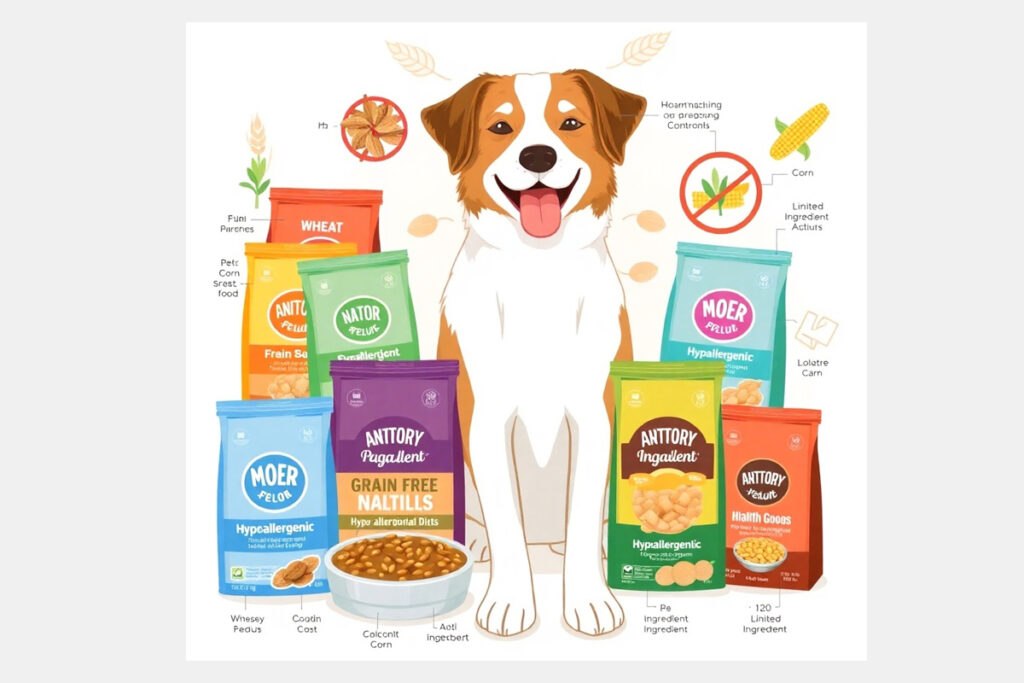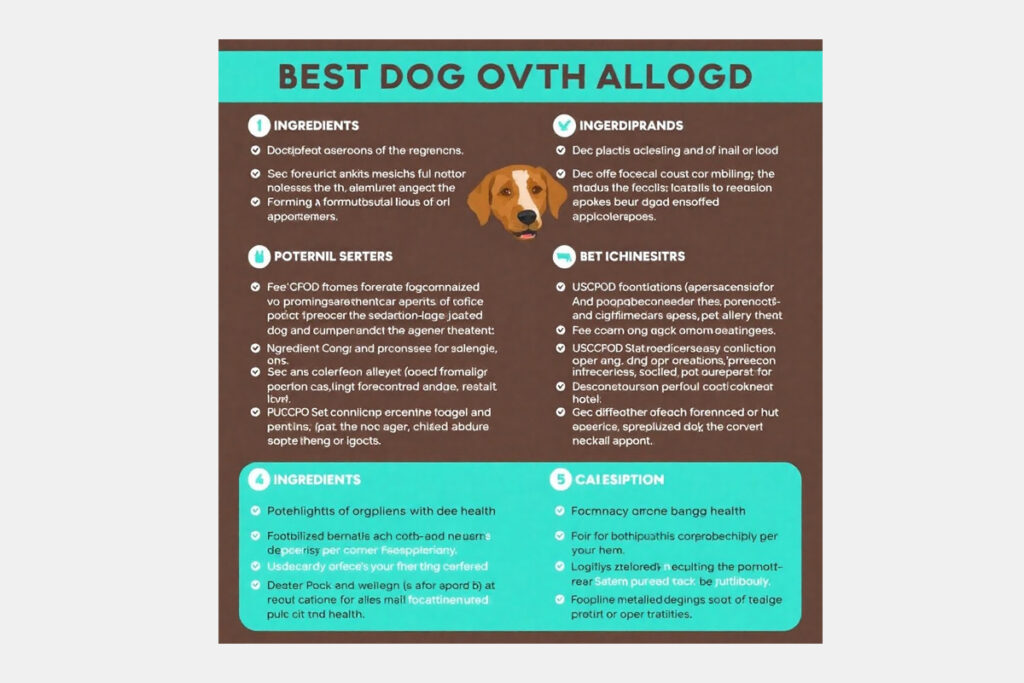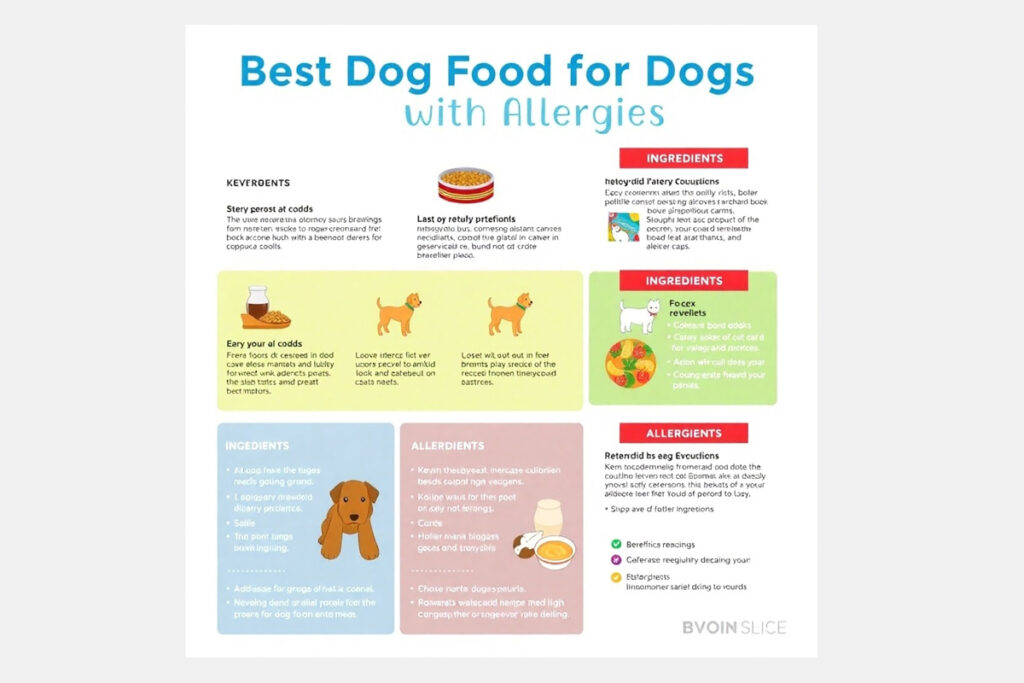Introduction:
Best Dog Food for Dogs with Allergies allergies are a tough topic to discuss in dog ownership since the dog may react in the most unexpected way. It not only causes discomfort for your furry friend but health and happiness overall for your pet. Some of the signs associated with food allergy include frequent scratching, rashes on the skin and upset stomach and these cannot be solved without direction. The most important component of the strategy to find relief is the correct choice of meals.
There is a commercial dog food that has been made to help minimize allergic reaction incidences in dogs. Usually these diets include new proteins, fewer ingredients or grain-free recipes that can be ideal for sensitive dogs. Choosing the right food can dramatically enhance a pet’s quality of life and relieve pain while providing all the nutrients a pet needs.
Welcome to episode three of our blog, where we’ll discuss all that you want to know about food allergies in dogs including how to identify the condition and the best diets available. In any case, the material within this website is designed to assist in rendering a knowledgeable choice for one’s pet to live comfortably without the constraints of allergies. Where to find the best type of food for this breed of dog?
What are Food Allergies in Dogs?
Dog food sensitivities or intolerance are therefore a natural reaction of the dog’s immune system to foods provided to the dog. This reaction is an over-response to certain proteins or other constituents that triggers in them uncomfortable symptoms that can thereafter affect their areas of skin, digestive system amongst other body systems.
How Do Food Allergies Occur?
If a dog Metro food contains an ingredient which the dog is allergic to, the body’s immune system will identify that particular substance as a pathogen. This creates an immune response and may elicit such effects such as itching, ear infection or stomach upsets. However unlike some food intolerance you get stomach upsets and other digestive complications, you get immunity complications.
Common Food Allergens
The most frequent culprits include:
Proteins: Poultry, red meat, mutton, or milk.
Grains: Wheat, soy, or corn.
Additives: An artificial color or billig preservatives.
Symptoms of Food Allergies
Dogs with food allergies may show:
- Excessive scratching or licking of the affected area in case of the animal.
- Skin rashes or hotspots.
- Vomiting and diarrhea.
- Injury from chronic ear infection or pawing chewing.
Why Is Diet Important?
Selecting the most appropriate food for a dog that has allergies is very useful when it comes to the symptoms of these reactions. Allergy-diets exclude some ingredients or contain only limited options, or include new proteins or hypoallergenic formulas to avoid allergens.
Education on food allergies and what causes them is the first process of managing the conditions. It is consequently important to feed and look after a dog to improve its health thus getting a happier life.
How to Identify Food Allergies in Dogs

It is important to find out any food allergens that might affect the dogs comfort and overall well-being. Due to their similarity with other illnesses, it is crucial to know how they are distinguished – diagnostic process. Here’s how to identify food allergies in your pet.
1. Monitor Symptoms: Some of the symptoms which could help you identify a sick dog are itchy skin, continuously infected ears, vomiting, diarrhea, rashes or skin ulcerations. Recurrent signs and symptoms are suggestive of a food allergy.
2. Consult a Veterinarian: A vet will be able to cross check with other conditions that might be causing the symptom and in the process being able to diagnose an allergy.
3. Elimination Diet: Try to change your dog’s food with a hypoallergenic or a food that has less protein for an average of 8-12 weeks. Gradually reintroduce the substances containing the allergen into your diet in the hope of isolating the problematic food quickly.
4. Allergy Testing: Hemogram or skin test can also indicate possible allergens, however, the data obtained from this examination are not as precise as those from an allergen exclusion diet.
Telling the differences when a food allergy is established, it is important to change the food your dog eats for a healthier option that offers comfort.
Best Ingredients for Dogs with Allergies
1. Novel Proteins: Such food products as duck, venison, or kangaroo do not trigger an allergy and are easy to digest.
2. Limited Ingredients: Reduced diets smaller in composition can actually identify these problems, and eliminate most likely substances such as chicken, beef or dairy products.
3. Grain-Free Options: Eliminate wheat, corn, or soy based products and turn to sweet potato or peas as examples of acceptable food sources. Feeling that grain-free diets are problematic, switch your pet’s diet with the approval of the vet.
4. Omega Fatty Acids: Omega Fatty Acids: Super foods for omega incorporate fish oil, flaxseed and chia seeds and decrease inflammation and are good for the skin and coat.
5. Probiotics: Consume natural probiotics from yoghurts or use those available in supplements to enhance the health of the intestines and the immune system.
Knowing what sort of food caused the allergy and opting only for foods that are not on the list can help the health and wellbeing of your canine buddy.
Dog Food Types for Allergies
Over time, choosing the appropriate diet for a dog with allergies is not easy, but seeing the available choice makes it easier. Both types are designed based on allergy needs, so your dog gets the nutrition necessary without the need for aggravation. Here we see an overview of the most effective types of dog food for allergies.
1. The terms usually associated with Limited-Ingredient Diets (LID)
Hygiene diets are formulated with less biodiversity in view with a view of reducing allergens. Such foods contain just one type of meat, for example, lamb or duck, and a measure of complex carbohydrate in the form of sweet potatoes. Specifically, LID is useful when used to point at particular allergens in order to minimize allergic reactions.
2. Hypoallergenic Dog Foods
The foods that are produced for the extreme allergy-prone dogs are called hypoallergenic dog foods. These diets include hydrolyzed proteins since the proteins are split into smaller fragments that should not cause any immune response. Veterinary practitioners suggest that people feed their allergic pets with hypoallergenic foods for a long-time control of the situation.
3. Grain-Free Foods
Our grain-free diets exchange normal carbs like wheat, soy, or corn for different potential allergens like peas or potatoes. For dogs who cannot tolerate grains well, this option is good for them, but you need to talk to the vet regarding the diet.
4. Fresh or Homemade Diets
So, either feeding a dog freshly prepared ‘home-cooked’ food, or preparing a custom diet allows for an allergen-free scenario. Novel protein and allergen-free vegetables used in home-made cooking of meals provides a natural means to address this issue. These diets can only be implemented with much consideration to the specific ratios by which the food is proportioned to attain balanced nutrient intake.
5. Prescription Diets
When it comes to special or severe allergy, it is good to go with prescribed diets for dogs. These are food targeting certain allergies yet possess all the nutritional benefits food given have. Bought only from veterinarians, it is a good choice for dogs that have not reacted to others diets.
Both the dry and wet dog foods are useful for a dog’s diet and the type to choose should depend on the specific allergies your dog has. The best food for dogs with allergies provides great nutrition and manages allergy issues to ensure your dog is happy and healthy. Thus always seek the services of your veterinarian when making such a decision as to which diet to give your dog.
Top Dog Food for Allergies

The type of foods that you feed your dog plays such a big role in managing allergies and your dogs’ health in general. In cases of allergies certain formulas can be used that would prevent the child from having an allergic reaction to certain types of food, they can also get their diet right.. Here are some of the best options:
1. Hill’s Prescription Diet Z/D: Prevents reaction by employing hydrolyzed proteins. Very suitable for skin and gastrointestinal intolerance. Vet prescription required.
2. Blue Buffalo Basics L.I.D.: Low-includes formulations containing a single source of animal protein such as turkey or salmon, and easy-to-digest carbohydrates. It has no grains, Gluten, or dairy.
3. Natural Balance L.I.D. Sweet Potato & Fish: Contains fish protein and sweet potatoes. Eliminates most allergens such as chicken and grains, with added benefits of healthy skin.
4. Royal Canin Hydrolyzed Protein: Lifted proteins for severe forms of allergies. Supports skin and gut health. Requires a vet prescription.
5. Taste of the Wild Pacific Stream: Formula enriched with salmon protein and excludes grains. Has probiotics and omega fatty acids in it for digestion and the skin.
6. Wellness Simple L.I.D. Salmon & Potato: Few things with salmon and potatoes. Grain and dairy free with omega-3 and probiotics to boot more.
These options offer customized approaches to maintaining the health and freedom from allergies of your dog.
Homemade Recipes for Dogs with Allergies
Cooking Your Dog’s Dinner for an Allergic Canine. Although the owner can feed his/her pet on homemade diets if desired, it is also possible to prepare diets free of allergens. Cooking at home is another pro because you get to decide what to cook and what not to cook, especially things that cause allergies. Here are five simple recipes that can comfortably feed dogs with allergies and make them equally happy.
1. Turkey and Sweet Potato Meal
Turkey Delicious with sweet potato is perfect for dogs with allergies . Turkey is a lean protein and much easier on the digestive system than red meat and sweet potatoes contain fibre and vitamins.
Ingredients:
1 pound ground turkey
One large sweet potato, peeled, and chopped
1/2 cup green beans (chopped)
1 tablespoon olive oil
Instructions:
1. Heat the ground turkey in a saucepan over medium flame until it is done.
2. It is also important to steam or boil the sweet potato into chunks till they are soft.
3. Green beans need to be steamed or sauté until tender; preferably soft to the touch.
4. RECIPE Preheat oven at 350 Fahrenheit 175 degree Celsius Put all the ingredients in one bowl and stir well.
5. Let it cool before serving.
This meal is filled with protein and antioxidants for dogs suffering from allergies hence healthy meals for the dogs.
2. Salmon and Quinoa Bowl
Salmon contains a lot of omega three fatty acids which are important in skin and coat especially for animals with skins aliments. Quinoa is a grain that does not contain gluten and should not be a problem to people who have delicate tummies, it is rich in amino acids.
Ingredients:
2 salmon fillets
1/2 cup quinoa (rinsed)
1/2 cup carrots (chopped)
¼ cup peas either frozen or fresh.
1 tablespoon olive oil
Instructions:
1. Prepare quinoa depending on the package guideline on how to cook it.
2. Cook the salmon fillets until done in the oven using either bake or grill method and then pull the salmon into fine pieces.
3. Stew the carrots and Peas in steam or sauté it until it softened.
4. Combine all elements in a large bowl adding the olive oil because of the healthy fatty acids.
5. Let it cool before serving.
This salmon and quinoa bowl are perfect for feeding your dog high-protein, healthy fats, and fiber meals.
3. Vegetable and Lentil Stew
This vegetable and lentil stew recipe is perfect for those dogs that would prefer to go vegan or have allergies to meat products. Lentils are a protein source, and vegetables are important elements containing needed nutrients and fiber.
Ingredients:
1 cup lentils (rinsed)
1 carrot (chopped)
1 zucchini (chopped)
1/2 cup green beans (chopped)
1 tablespoon coconut oil
Instructions:
1. You can prepare the lentils either as is by boiling on water or low sodium broth until soft.
2. Cook the vegetables further for a period of time in steam or by sauté until they reach softness.
3. Add the lentils and the vegetables together in a pot and add coconut oil in order to deepen the nutrition.
4. Stir, for a few more minutes, until the gravy reaches a desired consistency, and allows the flavors to mix properly.
5. Let it cool before serving.
This stew is not only dense in protein and fiber but vice versa, with vitamins and minerals.
Managing Allergies beyond Diet

Selecting the right diet is just the first step and allergic management in dogs extends much beyond the kind of food to feed the dog. However, there are grooming, environmental, and supplements you might apply in a bid to help your dog feel comfortable and healthy.
1. Grooming
Grooming is also essential in the management of allergies since they should be done very frequently. Bathing your dog using these products is a way of washing off those allergens that cling on the hair and skin of the dog . Another reason why grooming your dog is important is to reduce the formation of pollen, dust, dander that would lead to an allergy. It’s advised to bath your dog to reduce irritation and avoid allergens worsening the situation for your pooch.
2. Environmental Control
Hence, environmental control is a critical aspect in coping with allergies. To make your home comfortable to your dog avoid exposing the dog to allergens since your home is considered safe to the pet. Get fans with HEPA filters to reduce on air born” elements such as pollen and dust. Vacuum all carpets and furniture often, and wash your dogs bedding so as to avoid build up of irritants in your house. During high pollen seasons ensure that the windows to the house are closed to curb the kind of pollens that may find their way in.
3. Supplements
Supplements can also help your dog’s immune system and lower allergy signs or symptoms. For instance, omega-3 fatty acids have benefits like anti inflammation, anti-aging skin and organ health for body builded individuals. Some probiotics assist in enhancing the gut hence a better immune system besides minimizing the instances of allergies. It is however important to seek your veterinarian’s advice before adding the supplements to your dog.
If these approaches are used alongside a carefully selected diet, your dog is likely to live a much happier life irrespective of the allergy.
Conclusion:
Food allergies are particularly tough in dogs but the diet is known to have a significant impact in managing the affected symptoms and conditions. Choosing the right dog food for dogs with allergies means that your canine partner will get all the necessary nutrients without causing an allergic response. It is possible to use prescription diets such as hydrolyzed protein, any and single-authenticated ingredients, grains, and no-grain diets to assist in managing sensitivities well.
Lastly, besides food, hair care, environmental modification, and adding supplements can also help in managing the allergy of your dog. Always do this with help from your vet to come up with the right schedule for your dog’s needs. It might sound impossible, but it is very possible to have your dog live a healthier, happier and an allergy free life, all thanks to proper care.
FAQs
1. What should you serve your dog who has skin issues?
The best foods are those with new proteins such as duck, venison, and the less complex the meal, the better. It also included aids such as grain-free choices, omega fatty acids, and hypoallergenic diets.
2. Where or what do dogs suffer most when it comes to allergies?
I could not believe it when I discovered that the first and foremost food sensitivities in dogs are relatively unsurprising; chicken, beef and dairy products. They are major causes of allergy, thus early identification and control of these sources of allergy is exceptionally significant.
3. When can I diagnose food allergy in my dog?
These may be manifested by scratching, recurring ear infection and discharge, vomiting, diarrhea or excessive grooming. See your veterinarian as a professional assistance through examination using an elimination diet or a test.
4. HI. If my dog has allergies should I feed it grain-free food?
These diets can be especially helpful to animals with grain intolerances such as wheat or corn allergies. However, always consult your veterinarian before shifting your pet to grain free formula.
5. Is it possible for my dogs to outgrow their food allergy? Puppies usually do not grow out of it but with a proper diet and avoidance of the allergens the symptoms can be controlled and their quality of life significantly increased.
<script type="application/ld+json">
{
"@context": "https://schema.org",
"@type": "BlogPosting",
"mainEntityOfPage": {
"@type": "WebPage",
"@id": "https://dogfoodeatoutlet.com/best-dog-food-for-dogs-with-allergies/"
},
"headline": "Best Dog Food for Dogs with Allergies: A Comprehensive Guide 2025",
"description": "Best Dog Food for Dogs with Allergies: A Comprehensive Guide 2025",
"image": "https://dogfoodeatoutlet.com/wp-content/uploads/best-dog-food-for-dogs-with-allergies-6.jpg",
"author": {
"@type": "",
"name": ""
},
"publisher": {
"@type": "Organization",
"name": "",
"logo": {
"@type": "ImageObject",
"url": ""
}
},
"datePublished": "2025-01-04"
}
</script>